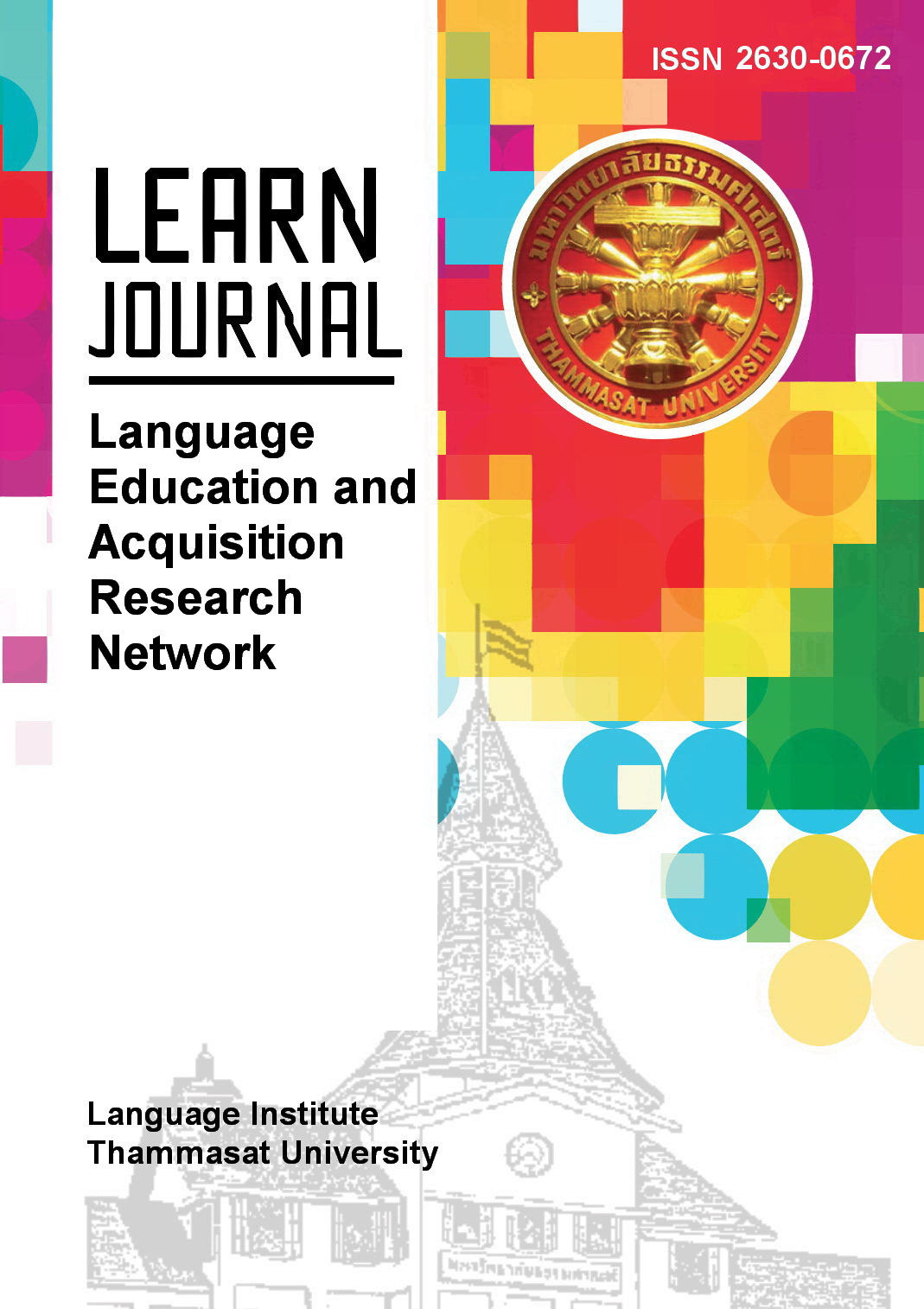Using Ideation Discussion Activities in Design Thinking to Develop EFL Students’ Speaking and Critical Thinking Abilities
Main Article Content
Abstract
Ideation, a phase of Design Thinking, merged with discussion activities is one innovative tool to encourage learners to speak and think critically towards a given topic. This research was conducted primarily to investigate the effects of ideation discussion activities in Design Thinking to speaking and critical thinking abilities of English as a Foreign Language (EFL) learners as well as their perception towards the concept. There were eight participants in the research study. Pre-test and post-test in speaking and critical thinking abilities, a set of survey forms, and participants’ reflective essays were the instruments used in the study. Descriptive statistics, paired sample T-test, and content analysis were employed to measure the data gathered after the participants attended the 84-hour sessions of ideation discussion activities in Design Thinking course at Rajamangala University of Technology Lanna (RMUTL), Chiang Mai. Results revealed that these ideation discussion activities in Design Thinking were relevant to enhance EFL learners’ speaking and critical thinking abilities. The level of agreement and the satisfaction of learners were high after they attended the sessions. It could be said that ideation discussion activities in Design Thinking could possibly enhance speaking and critical thinking abilities of EFL learners.
Article Details
References
Atkinson, D. (1997). A critical approach to critical thinking in TESOL. TESOL Quarterly, 31(1), 72-94.
Bashir, M., Azem, M., & Dogar, A. H. (2011). Factors affecting students’ English speaking skills. British Journal of Arts and Social Sciences, British Journal Publishing.
Buphate, T., Inta, K., & Esteban, R. (2018). Conference Proceedings in the ICELS 2018,. Suranaree University of Technology, Nakhon Ratchasima, Thailand. http://soctech.sut.ac.th/fl/newfl/wp-content/uploads/2019/09/Proceeding_ICELS-2018.pdf
Carroll, M., Goldman, S, Britos, L. Koh, J., Royalty, A. & Hornstein, M. (2010). Destination, imagination and the fires within: Design thinking in a middle school classroom. International Journal of Art and Design Education, 29(1) 37-53 10.1111/j.1476-8070.2010.01632.x
Carroll, M. (2014). Shoot for the Moon!: The mentors and middle schoolers explore the intersection of design thinking and STEM. Journal of Pre-College Engineering Education Research, 4(1), 14–30.
Cleminson, T. & Cowie, N. (2021). Using design thinking as an approach to creative and communicative and communicative engagement in the English as a Foreign Language (EFL) classroom. Journal of University Teaching & Learning Practice, 18 (4). 1-20 https://ro.uow.edu.au/cgi/viewcontent.cgi?article=2272&context=jutlp
Crite, K. & Rye, E. (2020). Innovating language curriculum design through Design Thinking: A case study of a blended learning course at a Colombian university. Science Direct. Retrieved December 30, 2021, from https://doi.org/10.1016/j.system.2020.102334
Dam, R. F. & Siang, T. Y. (2020). 5 stages in the design thinking process. Interaction Design Foundation. https://www.interaction-design.org/literature/article/5-stages-in-the-design-thinking-process
DeKeyser, R. M. (2007). Practice in a second language: Perspectives from applied linguistics and cognitive psychology. Cambridge University Press.
Fisher, A. (2001). Critical thinking: An introduction. Cambridge University Press.
Goldman, S., Kabayadondo, Z., Royalty, A., Carroll, M. & Roth, B. (2014). Student teams in search of design thinking. In C. Meinel, H.Plattner & L. Leiffer (Eds.), Design thinking research: Building innovation eco-systems (pp. 11-34). Springer International.
Hall, E. (1981). The silent language. Anchor Books.
Johnson, E.B. (2002). Contextual teaching and learning: Making teaching and learning activities exciting and meaningful. Mizan Learning Center.
Johnson, K. (1996). Language teaching and skill learning. Blackwell.
Katoroi, D. (2015). Improving students speaking skill through discussion technique, 1-17. Retrieved in https://www.academia.edu/12520324/Improving_Students_Speaking_Skill_Through_Discussion_Technique
Khan, S. (October 22, 2015). Design Thinking and its techniques. Cygnis Media. https://www.cygnismedia.com/blog/design-thinking-techniques/
Konchiab, S. & Pojchanapong, D. (2018). Conference Proceedings in the ICELS 2018,. Suranaree University of Technology, Nakhon Ratchasima, Thailand. http://soctech.sut.ac.th/fl/newfl/wp-content/uploads/2019/09/Proceeding_ICELS-2018.pdf
Kohls, C. (2019). Hybrid learning spaces for design thinking. Open Education Studies, (1), 228-242.
Kwek, S.H. (2011). Innovation in the classroom: Design thinking for 21st century learning. Retrived from https://web.stanford.edu/group/redlab/cgi-bin/publications_resources.php
Lawson, B. (2004). How designers know. The Architectural Press
Levelt, W. J. M. (1989). Speaking: From intention to articulation. Cambridge University Press.
Mohammed, M. F. (2021). The effect of Design Thinking in hybrid learning environment on developing the required persuasive speaking skills and academic self concept for 4th year English section students of the Faculty of Education, Helwan University, 1127-1183. Retrieved from https://drive.google.com/file/d/16WsJ0dzdpxdedJXQNXtIpluXtcVqEvwR/view
Ollerenshaw, S. (2019). Speak English: A collaborative language learning system using Design Thinking in second language education [Master of Design, Massey University, Wellington, New Zealand] https://drive.google.com/file/d/1oCvebFAl_QNzCZsIC36RLcOiB8aCCRwj/view
Razzouk, R., & Shute, V. (2012). What is design thinking and why is it important? Review of Educational Research, 82 (3), 330–348. DOI: 10.3102/0034654312457429
Riyanto, H. A. (2015). Improving speaking skill through small group discussion. [Master’s thesis, English Education Department of Teacher Training and Education Faculty State Institute for Islamic Studies (IAIN) Salatiga]
Rotherham, A. J., & Willingham, D. (2009). To work, the 21st century skills movement will require keen attention to curriculum, teacher quality, and assessment. Educational Leadership, 9, 15–20.
Rowland, G. (2004). Shall we dance? A design epistemology for organizational learning and performance. Educational Technology Research and Development, 52(1), 33–48.
Shute, V. J. & Torres, R. J. (2012). Where streams converge: Using evidence-centered design to assess Quest to Learn. 1-51. Retrieved from https://myweb.fsu.edu/vshute/pdf/shute%20pres_d.pdf
Singapore Polytechnic (2011). Design thinking. Version 1.1. Singapore
Tschimmel, K. (2012). Design Thinking as an effective toolkit for innovation. Proceedings from The XXIII ISPIM Conference: Action for Innovation: Innovating from Experience. Spain
Tsui, L. (1999). Courses and instruction affecting critical thinking. Research in Higher Education, 40(2), 187-188.
Wright, N. & Wrigley, C. (2019). Broadening design-led education horizons: Conceptual insights and future research directions. Int J Technol Des Educ 29, 1–23. https://doi.org/10.1007/s10798-017-9429-9
Zare, P., & Othman, M. (2015). Students' perceptions toward using classroom debate to develop critical thinking and oral communication ability. Asian Social Science, 11(9), 158.


